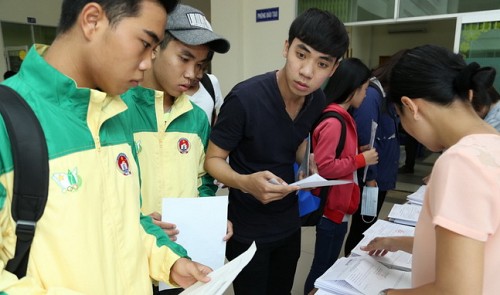The new state-regulated university admission process effective from this year in Vietnam has sparked outrage after high scorers in the country’s yearly national exams were denied admission while worse-performing applicants were accepted.
In Vietnam, senior high school students are required to sit the annual national exam in order to qualify for graduation, the results of which can also be submitted to their desired universities as part of their applications.
This year saw further changes to Vietnam’s state-regulated university admission process after the merger of the country’s high school graduation and university entrance exam into a single national exam in 2015.
Applicants are now allowed to submit their exam results to a maximum of four faculties from two universities or colleges in the first phase of the admission, and those who are denied by all four can wait for the second phase.
The criteria for admission is the applicants’ exam results, with anyone who scores higher than a university’s ‘entrance score’ in the national exam considered ‘passed’, while those falling short of the mark are considered to have ‘failed’.
As many universities were not able to admit enough students in the first phase, they had no choice but to lower their entrance scores in the second phase, giving students who applied later an edge even though their results might not have been as good.
Since any student is only allowed to apply for a limited number of universities, and submitted applications are non-withdrawable, many who settled for their second-choice university after the first phase were shocked to learn that they would have got into their first-choice university had they waited for the second phase.
Thanh Quy, a student from Bac Ninh Province in northern Vietnam, missed his chance to enroll in a business school in Hanoi due to the new policy, and said the fact the universities were allowed to set the entrance score for the second phase lower than that of the first phase was “absurd”.
“In previous years, entrance scores at the second phase were always higher than those for the first, since quotas were very limited,” Quy explained.
Meanwhile, the vice president of one university in Ho Chi Minh City blamed the country’s Ministry of Education and Training (MoET) for the confusion, saying the ministry had given universities orders not to over-admit during the first phase.
It is common practice for universities in Vietnam to over-admit, which means accepting more students than their assigned quotas, to cope with ‘phantom applicants’, or students who are admitted to more than one university.
Offering a different perspective, Assoc. Prof. Dr. Ho Thanh Phong, rector of International University, Vietnam National University – Ho Chi Minh City, said the admission policy had already been published in advance, and that it was up to students to either play it safe or wait for the second phase.
According to the rector, students who choose not to settle for a less desired university in the first phase are well aware that they are gambling and may risk not being admitted to any university at all if they also fail at the second phase.






















































